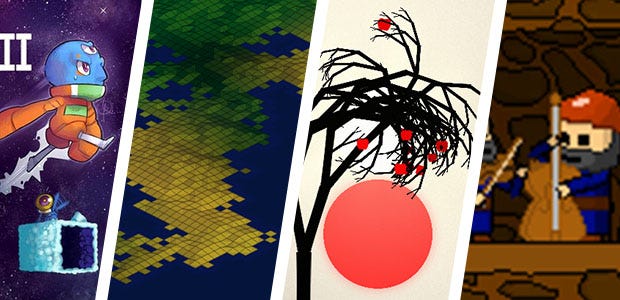DevLog Watch: Super III, Prune, Book Of Dwarf, More
Games In Their Earliest Stages
Last week I was in Switzerland on holiday, which meant I wrote a devlog watch but every update was about the mountains I hiked, the cowbells I heard, and the fresh baked bread I ate from my sunbaked patio. It was glorious. Can videogames compete?
Probably not, but devlogs featuring alien platformers, nuclear strategy, puzzling trees and simulated dwarves give it a good try below.
SUPER III
An action platformer about an alien named III, Super III's name is going to confuse a lot of people. But look at how physically satisfying its wall-jumping and teleportion appears, even without any art:
Then look at how it looks when it does have art, and suddenly there's a sense of a world to explore:
Wall-jumping, double-jumps, maybe a certain kind of action platformer in general; these are things I will apparently never grow tired of. All of the devlogs featured this month are new and short except for Super III, which is new and already 16 pages long. It seems other people can't get enough of this kind of thing either.
It's a keen demonstration of the power of devlogs and the reason you should consider starting one for your project: this game began as a "simple jam game," but has expanded and been encouraged by the immediate praise it received when other people saw it.
It Always Ends In Nuclear War
This is how you name a videogame.
It Always Ends In Nuclear War is a turn-based strategy game inspired by Civilization and Alpha Centauri, but with a welcome focus on reducing micromanagement and making the end game more interesting. I wonder how it'll do that?
It's early days as yet - the devlog began back in April - but even in that short time there's been dozens of screenshots posted showing the development of the world generation algorithm. There's also been discussion of the the changing scope and direction of the game.
So what the hell am I making, then? I don't quite know how to describe it, because I don't think there's anything out there that's doing what I'm trying to do. I'm aiming to make something akin to Conway's Game Of Life, but modeling human history instead of cells. A huge difference is that Conway's Game of Life is passive, where as this is going to be more game like. You're going to be in control of a Civilization and making overarching decisions for it. A lot of your civilizations development will be based on rules that you have little control over, but I'm going to try to strike a balance between simulation and gameplay.
The real reason to check in might be this larger folder of 450 development screenshots. "Every screenshot I've ever taken of my project," says its designer.
Prune
It's a good time for fans of trees in games. We're always wandering among them in one walking simulator or another, or looking forward to learning how to be them, and soon we'll be trimming them in puzzler Prune.
The DevLog only started a week ago, but the first proper update - about scoring in the game - is interesting in its detail about how best to rate player behaviour in a game about growing trees. It walks through the process of the systems prototyped and rejected:
So that’s how I landed on “fruit scoring.” It gave me the granularity I was looking for while being more transparent to the player. The score became a whole number of apples rather than those gross fractional amounts with the volume scoring. But I knew I didn’t want to do an apple per branch (or even for every ‘leaf’ branch) because it quickly became uncountable
How do you like them apples?
The Book of Dwarf
Any occurrence of dwarves in a management game is going to invite obvious comparisons, but if short, bearded bipeds are the thematic price we pay for communicable, easily explained AI simulations, then so be it.
The Book Of Dwarf swaps Dwarf Fortress's layered top-down view for a side-on look at the underground bases it prompts you to build. If only for that perspective change, it looks reminiscent of Sim Tower, but the focus is on deeply simulated characters.
There's nothing playable yet, but the devlog has plenty of detail of the creation of the game. The most recent post is about the game's lighting system, and there's an older blog with more about Unity programming, menu design and various systems necessary to building fortresses for dwarves.
Mini Updates
- This screenshot saturday entry for Stikbold should launch the dodgeball multiplayer game to the top of your wanted list.
- Gangster Tactics, covered previously, has been cancelled. Explanation. This is why devlogs are dreams, but that's OK.
- Reprisal Universe continues to grow into a finer spiritual successor to Populous than Godus.
And that's it for this week. Next week: Rock Paper Switzerland. Back my Patreon for regular updates about Switzerland. Or send me an email with a game you think I should feature here if you don't want the column to be about really nice cheese.












